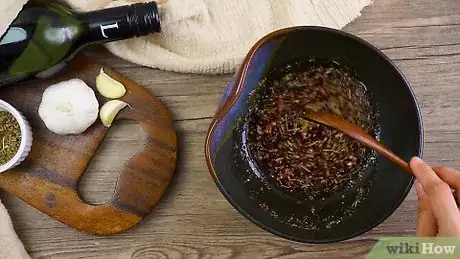wikiHow is a “wiki,” similar to Wikipedia, which means that many of our articles are co-written by multiple authors. To create this article, volunteer authors worked to edit and improve it over time.
The wikiHow Culinary Team also followed the article's instructions and verified that they work.
This article has been viewed 285,970 times.
Learn more...
Marinating pork seasons and tenderizes it. You can make your own marinade or buy a commercially prepared brand. The important thing to remember is that marinades should contain an acidic ingredient that tenderizes meat, so make sure you add that component into your recipe if you’re making a pork marinade yourself from scratch. In just a few hours or overnight, you can marinate pork chops, cutlets, ribs or roasts by completing the steps below.
Ingredients
Make-your-own marinade:
- Flavorful liquid, e.g., fruit juice or red wine
- Oil
- 1-2 cloves garlic, minced or 1 shallot, minced
- Salt and pepper to taste
- Herbs and spices
- Pork chops
Red wine pork marinade:
- 60ml red wine
- 1 teaspoon olive oil
- 2 cloves garlic, minced (or substitute with garlic powder)
- Salt and pepper
- 1/4 teaspoon dried sage
- 1/4 teaspoon oregano
- 1/4 teaspoon rosemary
- Pinch ground cumin
- Pork chops
Steps
Make-your-own marinade
-
1Begin to make a marinade by placing a flavorful liquid, such as fruit juice or red wine, in a medium bowl.
- The amount of liquid necessary will depend upon the size or amount of pork that you want to cook. In general, start with 1/4 cup of liquid for 4 chops and 1 quart of liquid for 6 to 8 pounds of ribs or whole roast. The liquid should cover the meat when it is placed in your marinating container.
-
2Add oil to your base liquid. Adding oil into your marinade will contribute to a crisp outer crust when the pork is cooked.Advertisement
-
3Add aromatic vegetables to your marinade.
- You can experiment with adding 1 or 2 minced cloves of garlic or 1 minced shallot to the mixture.
- The garlic will infuse the marinade with an intense garlic taste, while the shallot will impart a more subtly blend of garlic and onion flavor.
- If you want a more subdued taste of garlic and/or onion, consider added dried garlic and onion powders instead.
-
4Season the mixture with salt and ground pepper, to taste.
-
5Add herbs or spices, to taste, and mix well with a fork or small whisk.
- Dried sage, rosemary, oregano and ground cumin are typical pork seasonings.
- To marinade 4 pork chops, use a blend of dried spices to equal 1/2 to 1 teaspoon. Use up to 3 tablespoons of dried herbs for ribs and roasts.
- When using fresh herbs, use approximately 3 times the amount that you would use in dried form.
-
6Leave the marinade in the mixing bowl or pour it into a large zipper-lock plastic bag.
- The bowl may be big enough to hold several pork chops.
- A gallon-sized plastic bag will hold a slab of ribs, cut into 2 pieces, or a small roast.
- You can marinate large roasts in the pan in which they will be cooked, if it fits in your refrigerator.
-
7Place your meat in your marinating container and allow it to rest. You can place it in your bowl, or put it in your zipper-lock bag.
- Allow the meat to rest, turning it occasionally.
- Allow your pork chops to rest and marinade, at room temperature for 1 hour.
- Refrigerate pork tenderloin, ribs or larger roasts and marinate for 1 to 2 days. It takes longer for large cuts to tenderize and become infused with the flavors of the marinade.
Red wine pork marinade
-
1Pour the red wine into a mixing bowl.
-
2Add the olive oil and garlic.
-
3Season with salt and pepper. Add the herbs and spice.
-
4Mix everything together. Leave in a mixing bowl or zipped plastic food bag.
-
5Add the pork chops and leave to marinate for 1- 2 hours.
-
6Cook as you usually would.
Community Q&A
-
QuestionCan I leave marinated uncooked pork unrefrigerated?
 Community AnswerI just did yesterday, but you want to make sure that all parts get heated to 170 degrees. Meat (not fish!) is edible longer than most people would be willing to eat it. In other countries (including Britain, Norway and Italy) they deliberately age meat, often for years, and eat it raw!
Community AnswerI just did yesterday, but you want to make sure that all parts get heated to 170 degrees. Meat (not fish!) is edible longer than most people would be willing to eat it. In other countries (including Britain, Norway and Italy) they deliberately age meat, often for years, and eat it raw! -
QuestionWhat if I marinate it overnight?
 Community AnswerYour meat will become soft and flavorful.
Community AnswerYour meat will become soft and flavorful. -
QuestionDo you poke holes in the meat prior to putting it in the marinade?
 Rupert PriceCommunity AnswerDo not poke holes in meat before marinating. This actually drains out the juices. Don't use very thick marinades, since these don't penetrate the food very well. Be sure to cover the food completely with the marinade.
Rupert PriceCommunity AnswerDo not poke holes in meat before marinating. This actually drains out the juices. Don't use very thick marinades, since these don't penetrate the food very well. Be sure to cover the food completely with the marinade.
Warnings
- Citrus juice will react to aluminum and create a bad taste. Use a glass or plastic bowl when mixing the marinade.⧼thumbs_response⧽
- Uncooked meat contaminates the marinating liquid with bacteria. If you want to baste the meat as it cooks, first heat to a boil any leftover marinade that has come in contact with raw pork.⧼thumbs_response⧽
Things You'll Need
- Medium mixing bowl
- Fork or small whisk
- Gallon-size resealable plastic bag
About This Article
To marinate pork, choose a flavorful liquid, like fruit juice or red wine, and pour enough into a medium-sized bowl so that it will cover the meat. Next, add oil and aromatic vegetables, like garlic and shallots, to the liquid. Then, season the mixture with salt, pepper, and any herbs or spices that you'd like, such as dried sage, rosemary, or oregano. Finally, place the pork into the liquid and allow it to rest at room temperature for 1 hour, turning it occasionally. For a specific red wine marinade recipe, read on!
























































